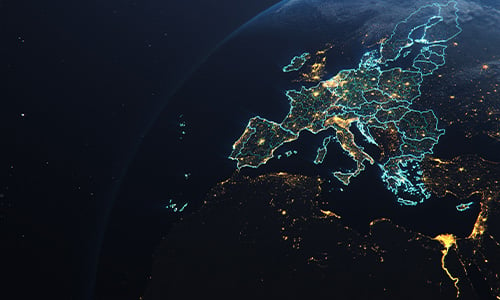The EU’s VAT in the Digital Age (ViDA) Directive is the cornerstone of an ambitious transformation of value-added tax (VAT) across the single market. Adopted in March 2025, it sets out to modernise VAT reporting, expand one-stop-shop registration, mandate e-invoicing and strengthen compliance across the EU.
For Irish businesses, recent developments in the Irish Budget 2026 have introduced critical milestones and timelines to the ViDA implementation path.
Key ViDA changes
- The Directive empowers Member States from April 2025 to mandate domestic structured e-invoicing (invoices using EN 16931 standard) for established taxpayers.
- From 1 July 2030, intra-EU B2B transactions must be issued via structured e-invoices and real-time reported.
- The existing European Sales List (ESL) is replaced by a “digital transaction-based reporting” (DTBR) model enabling near-real-time cross-border VAT data sharing.
- The One-Stop-Shop (OSS) regime is expanded: from 1 Jan 2027 to include B2C supplies of electricity, gas and heat; and from 1 July 2028 to cover all B2C supplies of goods and services and intra-EU stock transfers.
Irish Budget 2026: What this means for Ireland
In October 2025, Ireland’s Budget 2026 signalled an accelerated path for domestic e-invoicing and VAT modernisation in line with ViDA. The Revenue Commissioners has published an implementation roadmap for domestic B2B e-invoicing and real-time digital reporting.
Crucially, although the EU cross-border e-invoicing mandate remains 1 July 2030, the staged rollout for domestic Irish business is now moving forward: by late 2028 large VAT-registered corporates will need mandatory e-invoicing, full rollout for all VAT-registered businesses engaging in cross-border trading by November 2029.
Implications for business
For companies operating in Ireland – especially those engaged in intra-EU B2B trade or supplying goods/services cross-border – the reforms mean:
- Systems, processes and ERP/invoicing platforms must be assessed now: structured invoice formats, real-time data flows to Revenue, digital transmission protocols.
- Time-bound compliance: although July 2030 is the EU deadline, earlier domestic milestones mean preparation should begin sooner.
- Tax-registration impacts: the extended OSS will reduce the need for multiple VAT registrations across Member States – but businesses need to track the evolving rules on B2C supplies and intra-EU stock transfers.
- Strategic opportunity: VAT compliance is moving from periodic filing to continuous digital reporting. Early adopters can streamline VAT liability management, reduce administrative burden, and improve cross-border trading ease.
Recommendations at glance
- Undertake a VAT-process audit focusing on invoicing systems, data-capture, transmission architecture and internal controls.
- Map your cross-border supply chain (intra-EU goods, services, platforms) to determine potential OSS registration benefits and e-invoicing impact.
- Monitor forthcoming guidance from Revenue and align your IT/invoice-process roadmap to the phased timelines.
- Communicate with finance, tax and operations teams now: this change touches invoicing, supply-chain, IT and tax-compliance functions.
With the ViDA reforms now firmly on Ireland’s horizon and Budget 2026 signalling concrete action, businesses should treat VAT modernisation not simply as a compliance burden, but as an opportunity to streamline processes, strengthen cross-border resilience and position for a digital-first VAT era.





Get tailored support with ViDA VAT reform
The VAT in the Digital Age (ViDA) changes will reshape how businesses handle VAT compliance across the EU. If you need guidance on how the reforms affect your operations — from e-invoicing requirements to OSS expansion — our indirect tax specialists are here to help.









